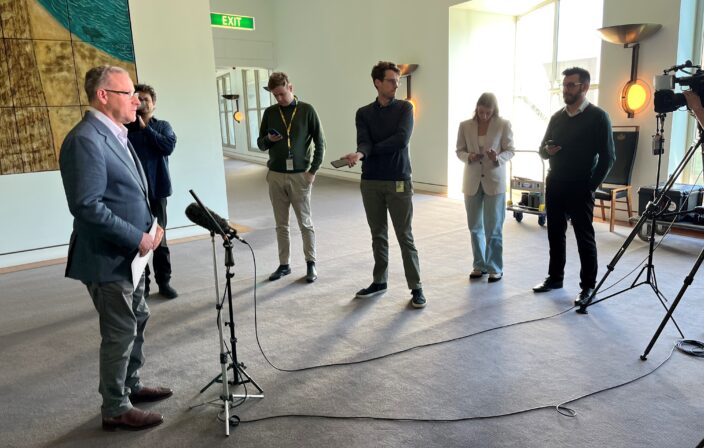Andrew McKellar interview with Danica De Giorgio, Sky News AM Agenda
10 Nov 2022
|Transcripts
Event: Andrew McKellar interview with Danica De Giorgio, Sky News AM Agenda.
Speakers: Andrew McKellar, chief executive Australian Chamber of Commerce and Industry; Danica De Giorgio, host Sky News AM Agenda.
Date: 10 November 2022.
Topics: Secure Jobs, Better Pay Bill; industrial relations campaign.
E&OE
Danica: Six of Australia’s biggest and most influential business groups are banding together in an effort to have the government’s industrial relations bill scrapped in its current draft. The government has set its sights on getting the legislation passed by Christmas. Joining me now live is the CEO of the Australian Chamber of Commerce and Industry, Andrew McKellar. Andrew, thank you so much for joining us. We’ve just seen in the last 10 minutes Tony Burke introducing that Bill into Parliament. What part of the reforms concern you the most?
Andrew: Good morning, Danica. Look, I think as business looks at this more and more closely, then I think the alarm across all sectors, small business, medium sized businesses, it’s really growing. This is a very complex piece of legislation. The government knows that they’ve been rushing this. They know that they didn’t have all of the detail right when they originally put the bill into the Parliament. Now, they’re bringing in a raft of amendments. They’re very complex amendments. It’s not getting any simpler. We really can’t understand all of the effects that this Bill is going to have. But one or two things are very clear, it is going to make life much more difficult for small and medium sized businesses. It will take control away from those businesses. It will hand it to unions and to the commission. It will lead to an outcome where many businesses face the prospect of wage increases, additional costs that they can’t afford, that they don’t want, and that won’t be offset against improvements in productivity or processes at the enterprise level. That’s very dangerous for those businesses. It’s very dangerous for the economy and for households more generally. It’s going to add into inflationary pressures, ultimately lead to higher interest rates. It makes the risk of recession much higher. It’s not a good outcome.
Danica: The government has said that it is willing to negotiate on these reforms. What sort of amendments would allay your concerns?
Andrew: That’s very difficult to say. We have been sitting down and having discussions in good faith with the government. The reality is it is a rush job. It is impossible, I think, to make this Bill workable from where it stands at the moment, and that’s what all of those business groups are saying. They’re saying that, at this point in time, this Bill is not fit for passage. And it’s not just business groups that are saying that. If you look at what’s coming out now, we’re seeing respected labour market economists, academics, saying that the Bill is not fit for purpose. Even academics who normally are not supporting an employer perspective, much more often supporting a union or employee perspective on these sorts of issues, they’re coming out now and saying that it’s just not fit for passage. It’s a real concern and I think the government has to pull back here and think about what it is trying to achieve with this Bill.
Danica: You mentioned wages, the government was elected on a basis of getting wages moving, so don’t they have a mandate to do so?
Andrew: Well, they made that very clear, and business supports that objective. The problem here is that this is endangering the economy. The reality is this is going to lead to job losses. It’s going to lead to outcomes that won’t be fit for purpose at the workplace level. It’s doing a lot more than potentially trying to increase wages. It’s handing power to trade unions. It’s giving them a right of veto in many cases which they don’t have currently, and the consequences of that are far reaching and extremely undesirable from an economic standpoint. So, honestly, this is bad legislation. The government, I think, really should go back, and have a rethink. We should be sitting down with unions, with government, with employers, with business groups, working together, trying to get an outcome which will deliver on the commitment that the government gave, and then it will have the support of business. It doesn’t at the moment.
Danica: Will the ACCI mount an ad campaign or join a campaign that’s being talked about with other business groups to fight against these changes?
Andrew: Look, there are many groups and many businesses who are very concerned about this. We’re not going to get into the game of threatening to do that sort of thing. We’ll have reasonable, good faith discussions with the government. We’re talking to senators, members of Parliament at the moment. But, of course, at any point in the future, we will strongly represent the views of our members. If that’s what they want to do then, of course, that’s something that comes into play at some point in the future. That’s not the way we want to conduct the discussion at the moment. We want this to be a calm and rational consideration of the bill, but, obviously, in its current state, we would say very clearly it is not fit for purpose, it’s not fit to be passed by the Parliament, and we’ve got to work that through.
Danica: So, you’re leaving the door open then for a campaign? Have you at all had active discussions about pouring money into this?
Andrew: No. There are groups that are undertaking those sorts of discussions. We’re not threatening. That’s not our style of operation. We’ll have a calm and reasonable discussion. Of course, if it gets to the point where there’s a view that there should be more communication at a public level to inform people and businesses about the impact of what’s happening as a result of legislation, then, of course, that’s something that can be looked at down the track. And trade unions in the past have never hesitated to go down that path when they thought that it served their interests. We’ll always be standing up for business and business interests. We want to see a stronger Australian economy. We want to see the high levels of employment that we have maintained. We want responsible wage outcomes that deliver higher living standards. Those are the things that we’ll always be standing up for.
Danica: Andrew McKellar, we have to leave it there. Thank you so much.


